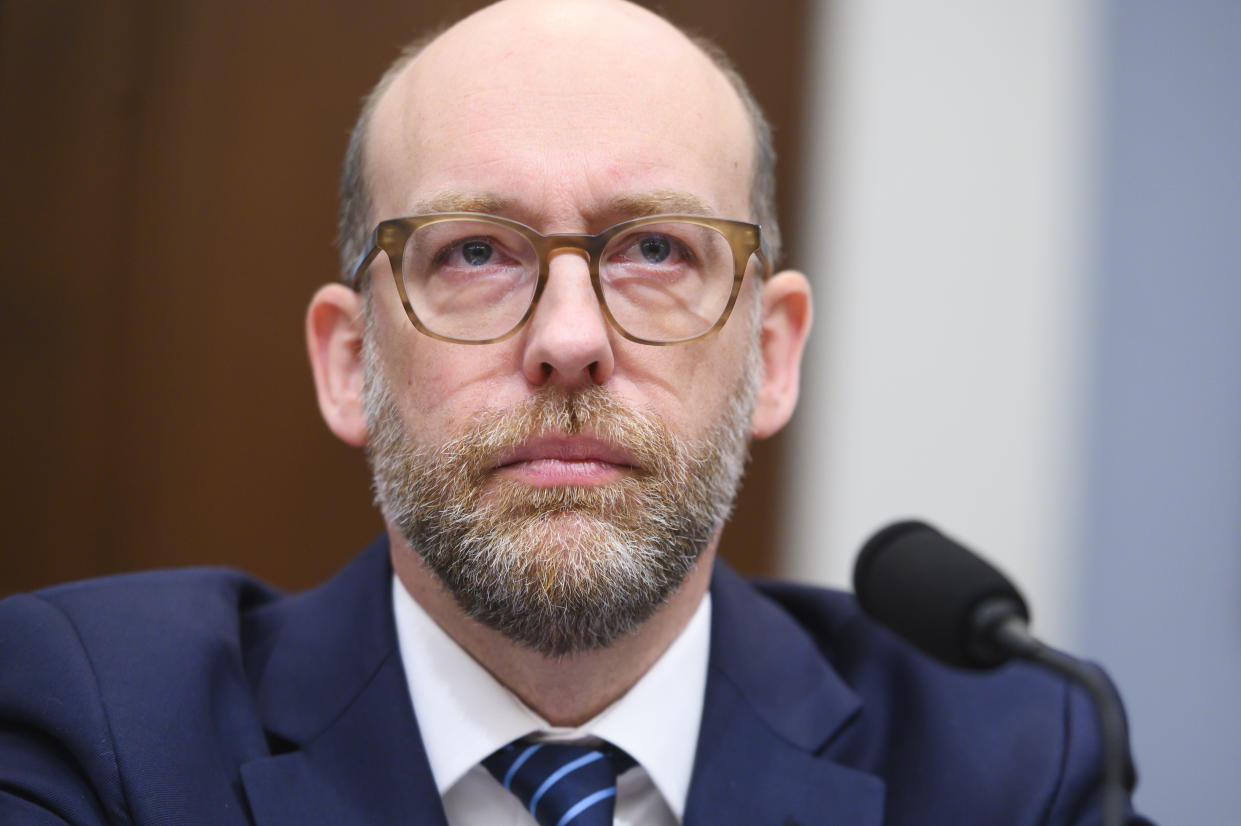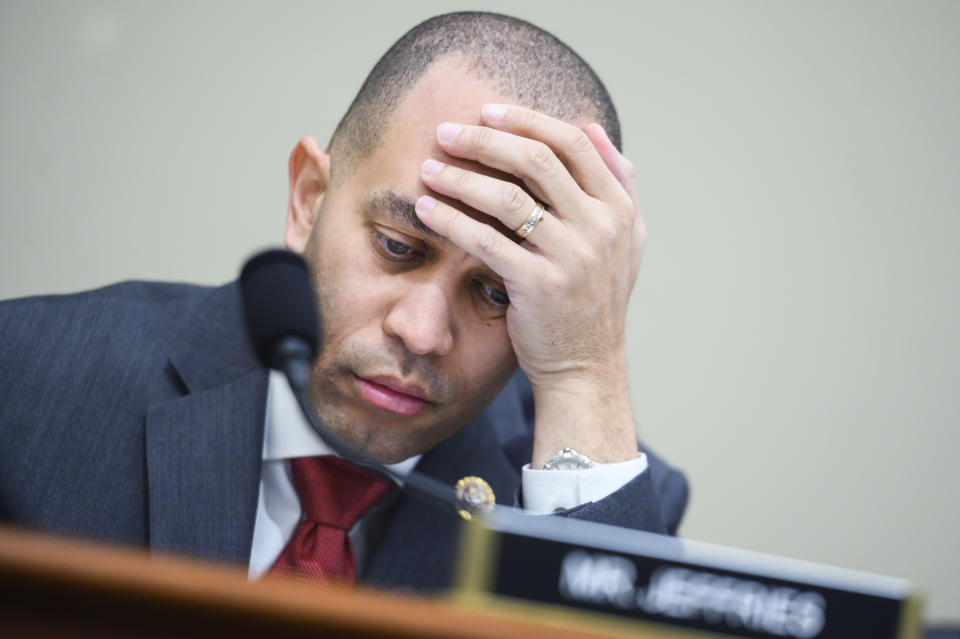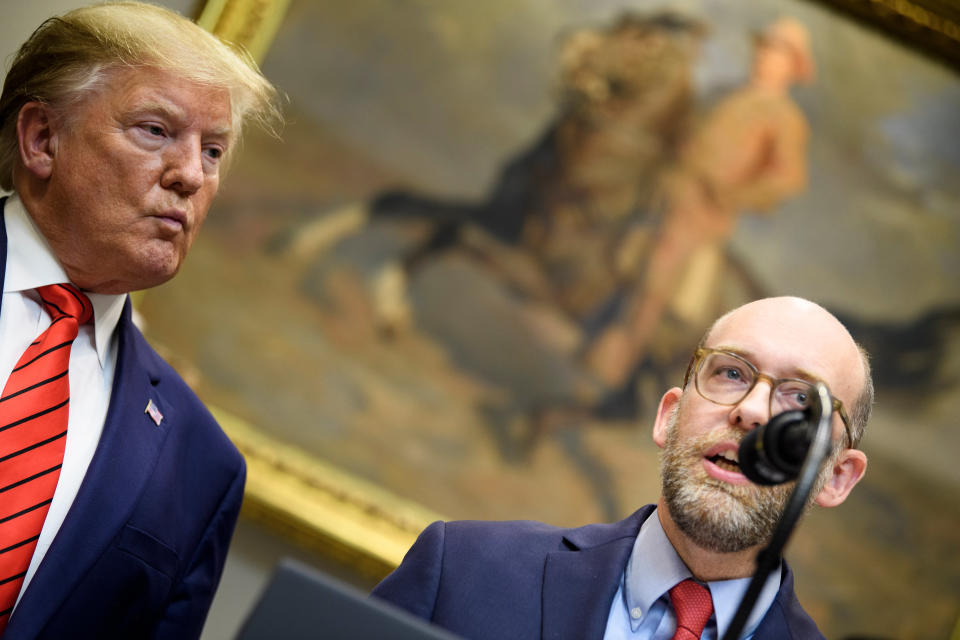Democrats grill Trump's budget chief on White House spending plan

WASHINGTON — In a frequently rancorous hearing, House Democrats took White House budget chief Russell Vought to task as he tried to defend the Trump administration’s proposed cuts in a variety of areas, from food stamps to the arts.
“The president's budget is a living, breathing fact check on all of the public lies that he's told relative to his policy priorities,” thundered Rep. Hakeem Jeffries of New York, a prominent House Democrat.
Trump on Monday released the $4.8 trillion budget, which includes $2 billion for a wall on the border with Mexico, despite that when he first ran for president, he promised Mexico would foot the bill. Mexico has declined to do so. The budget also anticipates that the tax cut package passed in 2017 will be renewed in 2025, though those cuts contribute to the deficit Trump has vowed to eliminate.
A senior administration official said that “President Trump’s budget grows the economy, protects the American people and offers better care at lower cost.” The official surmised that the Democrats were not introducing a budget resolution of their own “because they are scared to show their massive tax hikes and candidates’ $100 trillion spending plans.”
During the hearing, Democrats repeatedly noted that while Trump has promised to protect Americans with preexisting health conditions, his newest budget includes $1 trillion in cuts to Medicaid and subsidies related to the Affordable Care Act, the Obama-era health law. Trump has said he will provide the same protections through some other, yet-unspecified means.
“It’s not just his commitment that he has repeatedly articulated,” Vought said of Trump’s frequent, if vague, assertions that he would come up with a system that is both superior to, and cheaper than, the one created by the Affordable Care Act. “He has put forward plans, or supported plans, that do this.”
Vought went on to say that “the president is working on his own plan” to cover people with preexisting conditions. It is a plan “that we are not yet ready to reveal,” he added.
Though other aspects of the budget proved problematic, none were as contentious as the health care cuts. In 2018, Democrats successfully retook the House of Representatives from Republicans by arguing that Trump and his congressional allies would attempt to eviscerate the protections instituted by Obama’s health act.

The new budget document appears to allow them to make that argument all over again, this time with the presidential election approaching.
Rep. Jan Schakowsky, D-Ill., listed the administration’s proposed cuts to Medicare, Medicaid and Social Security disability insurance, making the point that Trump was set on harming the very seniors and “forgotten Americans” he had once promised to protect.
“Am I right?” she asked.
If the question was meant to be rhetorical, Vought did not take it that way. “No, you’re not,” he shot back loudly. “The president fully protects Social Security and Medicare in this budget.”
He seemed to be arguing that the president intends to enforce savings while maintaining coverage, though the exact nature of his proposals was not clear.
The proposed $4.8 trillion budget also includes a 21 percent reduction in foreign aid, a 9 percent reduction in the budget for the Centers for Disease Control and Prevention, a 26 percent cut to the Environmental Protection Agency’s budget and a 15 percent reduction to the budget of the federal Department of Housing and Urban Development. Programs for the arts would be wiped out altogether. Overall, military spending would rise to $740.5 billion, while domestic spending would fall to $590, according to the Wall Street Journal.
Vought acknowledged that the budget document does not account in any way for the potential costs of climate change. Last year, a Government Accountability Office report found that since 2005, the government has spent $450 billion in relief associated with climate-related disasters like floods and fires.
In his opening statement, Vought tried to justify the administration’s manifold proposed cuts by invoking fiscal responsibility. “Washington’s pastime of spending without consequence must be stopped as it threatens long-term economic prosperity,” he said. The budget does propose to drastically reduce the federal deficit, which is nearly $1 trillion, but critics have called that calculation “entirely dishonest” and predicated on “phony” projections.
The spending blueprint was in keeping with previous Trump budgets, which have included drastic cuts to popular social programs. But the White House budget is only a proposal. Time and again, Congress has roundly rejected Trump’s budgetary wishes, restoring cuts he had proposed in its reworking of the budget while giving him the increased military spending he has demanded.
But even though the annual budgetary process has been predictable — no small feat at a time when Washington is riven almost daily by unpredictability — it is not without drama. The various spending proposals allow all sides to assert their values, whether they have to do with public radio or ballistic missiles.
Vought repeatedly clashed with House Democrats and routinely praised President Trump for creating jobs. At the same time, under questioning from an increasingly irritated Rep. Albio Sires, D-N.J., Vought refused to say if any jobs at all had been created under President Obama.
“I can’t tell you based on where it started versus where it ended, but we lost manufacturing jobs,” Vought said of Obama’s job record. He put the number of manufacturing jobs lost under Obama at 200,000.
In fact, Obama created 11.3 million jobs, though manufacturing jobs did decline.

As for what he saw as a potent symbol of government waste, he invoked the purchase of a Bob Dylan sculpture for the U.S. Embassy in Mozambique, incorrectly asserting that it cost $1 million. The sculpture was controversial even within the State Department, but it’s actual cost — $84,375 — is small compared to other expenditures in the budget. For example, Trump’s critics point out the president has spent some $115 million in taxpayer funds on his frequent golfing excursions to South Florida and New Jersey.
Vought also singled out $4,800 he said had been spent to send American artists to a poetry festival in Finland. “Little by little,” Vought said in defending such minor cuts.
Little in what he said pacified angry Democrats. At one point, Vought came under sharp attack from Rep. Sheila Jackson Lee, D-Texas, who called the budget — titled “America’s Future” — a “destructive document for ending America’s future.” She took specific issue with proposed work requirements for some social safety programs, including those related to health care and food assistance. Jackson Lee said that such requirements, were rooted in racial prejudice.
“Congresswoman, that is ridiculous,” Vought interrupted. The two then engaged in a heated back-and-forth that, like the rest of the hearing, issued from an ideological divide that seems to grow wider by the day.
“I’m stunned,” Jackson Lee concluded, a reaction that appeared to be widely shared by her Democratic colleagues. Republicans on the budget committee, for their part, defended Vought, while insisting that Democrats had produced no budgetary vision of their own.
Vought’s appearance before the House Budget Committee was also notable because it was his first testimony since the opening of the impeachment inquiry in September. Vought is believed to have been closely involved in withholding military aid from Ukraine until authorities there announced an investigation into President Trump’s political opponents. The aid was eventually released, but only after news of the hold became public.
Asked to appear before a congressional impeachment panel, Vought refused. An unapologetically partisan figure — a striking departure from budget directors past of both parties — Vought derided the impeachment inquiry as a “sham process.”
Ukraine was not discussed during the budget hearing, but Vought did discuss assistance to hurricane-ravaged Puerto Rico, a U.S. territory. Trump only released $8 billion in aid to Puerto Rico last month, though the hurricane struck nearly three years ago.
“We don’t want this money to go to waste,” Vought said, citing allegations of corruption in Puerto Rico’s government. Similar concerns were deployed to withhold the aid in Ukraine, despite the Pentagon certifying that anticorruption measures had been met.
In the closing session, committee Chairman John Yarmuth, D-Ky., asked Vought about the budget office complying with the Congressional Budget and Impoundment Control Act of 1974. The budget office was found to have violated that very law in withholding aid from Ukraine, according to a report by the nonpartisan Government Accountability Office.
“We believe we’ve been transparent,” Vought responded, though he added that he wanted to continue his testimony “without relitigating the last several months,” in what was an obvious reference to impeachment.
Avoiding the Ukraine issue could prove difficult for Vought, given his role in the still-murky affair. Reporters followed him out of the hearing room, and some attempted to ask him about Ukraine, which is set to receive a fresh round of funding in the new fiscal year, even as the debate about the previous year’s funding continues.
“I am not going to take any tools that the president has off the table,” Vought said, “but I don’t anticipate anything on that front.”
Read more from Yahoo News:



